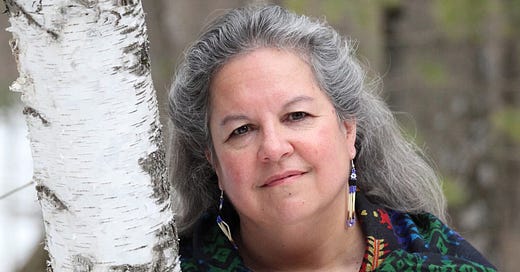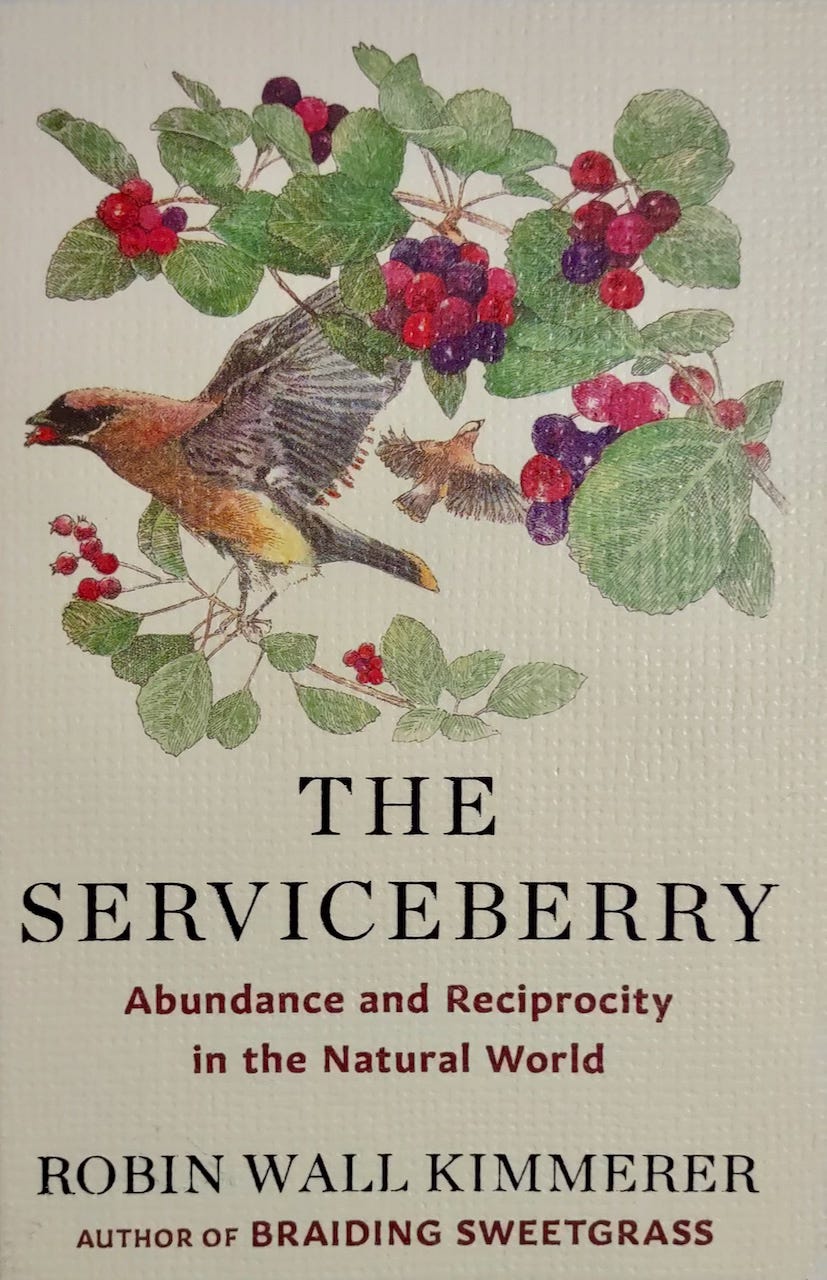Potawatomi botanist Robin Wall Kimmerer admits that she’s “spent a lifetime asking plants for guidance . . .”
Kimmerer, of Syracuse, New York, is a SUNY Distinguished Teaching Professor of Environmental Biology and founder of the Center for Native Peoples and the Environment. She became known worldwide for her best-selling books, Braiding Sweetgrass and Gathering Moss – “a braid of stories meant to heal our relationship to the world.” Kimmerer’s Indigenous culture brings a deeper understanding to her scientific knowledge of the environment.
“The practice of observing the living world and taking inspiration for human ways of living from its model is an essential element of Indigenous science,” Kimmerer said. “It embraces the reality that there are intelligences other than our own, from whom we might learn.”
In her latest work, The Serviceberry: Abundance and Reciprocity in the Natural World, Kimmerer reflects that the simple act of picking sweet, juicy serviceberries from her neighbor’s patch has reminded her to view the Earth’s natural resources not as commodities to be exploited, but as gifts for which we should be grateful.
“Conceiving of something as a gift changes your relationship to it in a profound way,” Kimmerer writes. For example, you might appreciate a stocking cap knit for you by a favorite aunt much more than an off-the-shelf hat from a discount store.
“I imagine if we acknowledged that everything we consume is the gift of Mother Earth, we would take better care of what we are given,” she mused.
Receiving those gifts brings with it a responsibility to share, respect, and reciprocate, Kimmerer notes – and to acknowledge the relationships that tie all the Earth’s citizens together. Deer and moose browse on serviceberries. Their early-blooming flowers provide pollen for insects. Birds feast on the berries, then pass the seeds on – scarified and with a bit of fertilizer – to germinate and grow into more serviceberries, which “weave myriad relationships between insects and microbes and root systems.”
“The gift is multiplied with every giving,” Kimmerer continued, “until it returns so rich and sweet that it burbles forth as the birdsong that wakes me in the morning.”
Many Indigenous Peoples have inherited a “culture of gratitude” for the gifts from the Earth.
“Enumerating the gifts you’ve received creates a sense of abundance, the knowing that you already have what you need,” Kimmerer said. Ironically, however, “Recognizing ‘enoughness’ is a radical act in an economy that is always urging us to consume more.”
Like many of us who are surrounded by society’s consumerism, Kimmerer sometimes feels trapped by a system that commoditizes everything, stressing accumulation rather than sharing.
“I lament my own immersion in an economy that grinds what is beautiful and unique into dollars, converts gifts to commodities in a currency that enables us to purchase things we don’t really need while destroying what we do.”
Some might call it socialism – but perhaps the serviceberry demonstrates a more diverse, stable ecosystem and economy. The plants use light and water to produce flowers and food, which are shared with others.
“A system of distribution of goods and services that meets the needs of the community,” Kimmerer explained. “It is a system of redistribution of wealth, an exchange of goods and services. Each member has an abundance of something, which they offer to others.”
Kimmerer posed the threat of “unbridled capitalism” facing the Western world. “Extraction and consumption outstrip the capacity of the Earth to replenish what we have taken. An economy based on the impossibility of ever-expanding growth leads us into nightmare scenarios . . . it is an engine of extinction.”
When Kimmerer’s neighbors invited people to pick surplus serviceberries for free, it seemed almost un-American! Why would they miss a chance to maximize their profits from their diverse farm?
“Well, they’re so abundant,” responded the farm owner. “There’s more than enough to share . . .”
Serviceberries, it seems, not only build relationships with sunlight, air, water, birds, soil organisms, butterflies, and other “more than human” beings – but also with members of the human community.
More and more people are valuing those types of relationships, Kimmerer said. For example, “The move toward a local food economy is not just about freshness and food miles and carbon footprints and soil organic matter. It’s about all of those things, but it’s also about the deep human desire for connection, for honor, to be in reciprocity with the gifts that you are given.”
Kimmerer argues eloquently and persuasively that messages from plants may hold the solutions to our ecological crises.
“Regenerative economies that reciprocate the gift are the only path forward,” she declared. “To replenish the possibility of mutual flourishing, for birds and berries and people, we need an economy that shares the gifts of the Earth, following the lead of our oldest teachers, the plants. They invite us all into the circle to give our human gifts in return for all we are given. How will we answer?”
SHAMELESS PLUG: I’m taking orders for The Serviceberry, to ship in early January. $20, tax and shipping included. Please message me for details.
I’m privileged to be a member of the Iowa Writers Collaborative, and diverse group of journalists who share perspectives on issues and experiences of interest to Iowans. Most posts are free - but paid subscriptions are appreciated. Please sample the work of our members.








Many years ago I posited that two questions grounded a sustainable relationship with our environment:
How much is enough?
And then what?
Whenever I apply them, they still work.
Great book. I especially love listening to her books on Audible. Her voice gives the stories added meaning and emotion. Keep up the good work, Larry.